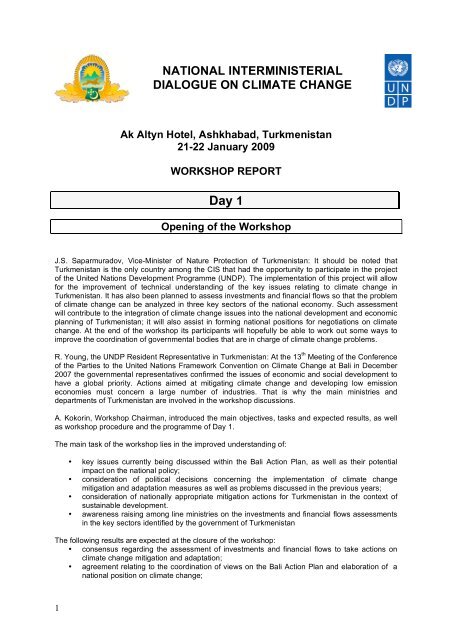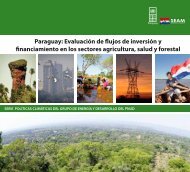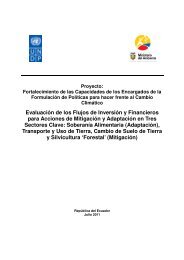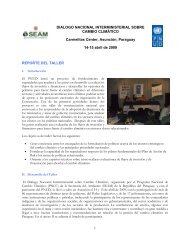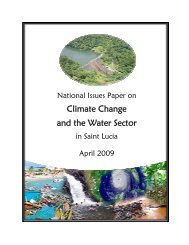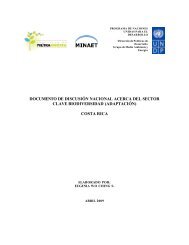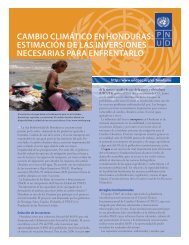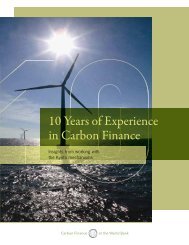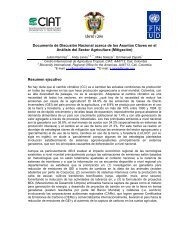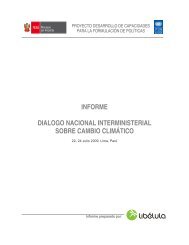national interministerial dialogue on climate change - UNDPCC.org
national interministerial dialogue on climate change - UNDPCC.org
national interministerial dialogue on climate change - UNDPCC.org
Create successful ePaper yourself
Turn your PDF publications into a flip-book with our unique Google optimized e-Paper software.
NATIONAL INTERMINISTERIAL<br />
DIALOGUE ON CLIMATE CHANGE<br />
Ak Altyn Hotel, Ashkhabad, Turkmenistan<br />
21-22 January 2009<br />
WORKSHOP REPORT<br />
Day 1<br />
Opening of the Workshop<br />
J.S. Saparmuradov, Vice-Minister of Nature Protecti<strong>on</strong> of Turkmenistan: It should be noted that<br />
Turkmenistan is the <strong>on</strong>ly country am<strong>on</strong>g the CIS that had the opportunity to participate in the project<br />
of the United Nati<strong>on</strong>s Development Programme (UNDP). The implementati<strong>on</strong> of this project will allow<br />
for the improvement of technical understanding of the key issues relating to <strong>climate</strong> <strong>change</strong> in<br />
Turkmenistan. It has also been planned to assess investments and financial flows so that the problem<br />
of <strong>climate</strong> <strong>change</strong> can be analyzed in three key sectors of the <str<strong>on</strong>g>nati<strong>on</strong>al</str<strong>on</strong>g> ec<strong>on</strong>omy. Such assessment<br />
will c<strong>on</strong>tribute to the integrati<strong>on</strong> of <strong>climate</strong> <strong>change</strong> issues into the <str<strong>on</strong>g>nati<strong>on</strong>al</str<strong>on</strong>g> development and ec<strong>on</strong>omic<br />
planning of Turkmenistan; it will also assist in forming <str<strong>on</strong>g>nati<strong>on</strong>al</str<strong>on</strong>g> positi<strong>on</strong>s for negotiati<strong>on</strong>s <strong>on</strong> <strong>climate</strong><br />
<strong>change</strong>. At the end of the workshop its participants will hopefully be able to work out some ways to<br />
improve the coordinati<strong>on</strong> of governmental bodies that are in charge of <strong>climate</strong> <strong>change</strong> problems.<br />
R. Young, the UNDP Resident Representative in Turkmenistan: At the 13 th Meeting of the C<strong>on</strong>ference<br />
of the Parties to the United Nati<strong>on</strong>s Framework C<strong>on</strong>venti<strong>on</strong> <strong>on</strong> Climate Change at Bali in December<br />
2007 the governmental representatives c<strong>on</strong>firmed the issues of ec<strong>on</strong>omic and social development to<br />
have a global priority. Acti<strong>on</strong>s aimed at mitigating <strong>climate</strong> <strong>change</strong> and developing low emissi<strong>on</strong><br />
ec<strong>on</strong>omies must c<strong>on</strong>cern a large number of industries. That is why the main ministries and<br />
departments of Turkmenistan are involved in the workshop discussi<strong>on</strong>s.<br />
A. Kokorin, Workshop Chairman, introduced the main objectives, tasks and expected results, as well<br />
as workshop procedure and the programme of Day 1.<br />
The main task of the workshop lies in the improved understanding of:<br />
• key issues currently being discussed within the Bali Acti<strong>on</strong> Plan, as well as their potential<br />
impact <strong>on</strong> the <str<strong>on</strong>g>nati<strong>on</strong>al</str<strong>on</strong>g> policy;<br />
• c<strong>on</strong>siderati<strong>on</strong> of political decisi<strong>on</strong>s c<strong>on</strong>cerning the implementati<strong>on</strong> of <strong>climate</strong> <strong>change</strong><br />
mitigati<strong>on</strong> and adaptati<strong>on</strong> measures as well as problems discussed in the previous years;<br />
• c<strong>on</strong>siderati<strong>on</strong> of <str<strong>on</strong>g>nati<strong>on</strong>al</str<strong>on</strong>g>ly appropriate mitigati<strong>on</strong> acti<strong>on</strong>s for Turkmenistan in the c<strong>on</strong>text of<br />
sustainable development.<br />
• awareness raising am<strong>on</strong>g line ministries <strong>on</strong> the investments and financial flows assessments<br />
in the key sectors identified by the government of Turkmenistan<br />
The following results are expected at the closure of the workshop:<br />
• c<strong>on</strong>sensus regarding the assessment of investments and financial flows to take acti<strong>on</strong>s <strong>on</strong><br />
<strong>climate</strong> <strong>change</strong> mitigati<strong>on</strong> and adaptati<strong>on</strong>;<br />
• agreement relating to the coordinati<strong>on</strong> of views <strong>on</strong> the Bali Acti<strong>on</strong> Plan and elaborati<strong>on</strong> of a<br />
<str<strong>on</strong>g>nati<strong>on</strong>al</str<strong>on</strong>g> positi<strong>on</strong> <strong>on</strong> <strong>climate</strong> <strong>change</strong>;<br />
1
• decisi<strong>on</strong> <strong>on</strong> the development of a <str<strong>on</strong>g>nati<strong>on</strong>al</str<strong>on</strong>g> strategy <strong>on</strong> <strong>climate</strong> <strong>change</strong> according to the new<br />
inter<str<strong>on</strong>g>nati<strong>on</strong>al</str<strong>on</strong>g> post-2012 agreement.<br />
G. Allaberdiev, Head of the Nati<strong>on</strong>al Group <strong>on</strong> Climate Change, <strong>org</strong>anized the presentati<strong>on</strong> of the<br />
participants: name, positi<strong>on</strong> and possible experience in the field of <strong>climate</strong> <strong>change</strong>.<br />
Turkmenistan and Climate Change<br />
G. Allaberdiev presented the main results of the research carried out in the course of the Sec<strong>on</strong>d<br />
Nati<strong>on</strong>al Communicati<strong>on</strong> <strong>on</strong> <strong>climate</strong> <strong>change</strong> in accordance with the UNFCCC, i.e. greenhouse gas<br />
emissi<strong>on</strong>s inventory, research <strong>on</strong> <strong>climate</strong> <strong>change</strong> mitigati<strong>on</strong> and adaptati<strong>on</strong> as well as priority sectors<br />
in c<strong>on</strong>necti<strong>on</strong> with <strong>climate</strong> <strong>change</strong>.<br />
The facilitator emphasized those presentati<strong>on</strong> slides, which displayed different scenarios of <strong>climate</strong><br />
<strong>change</strong> as well as an increase in greenhouse gas emissi<strong>on</strong>s. He was asked how the increase in<br />
greenhouse gas emissi<strong>on</strong>s would affect the ec<strong>on</strong>omy of Turkmenistan and whether such calculati<strong>on</strong>s<br />
had been made. In the framework of the Sec<strong>on</strong>d Nati<strong>on</strong>al Communicati<strong>on</strong> no ec<strong>on</strong>omic estimati<strong>on</strong><br />
was made, but it is the task under the UNDP Project to estimate the cost of acti<strong>on</strong>s aimed at <strong>climate</strong><br />
<strong>change</strong> preventi<strong>on</strong> and adaptati<strong>on</strong> in the three key ec<strong>on</strong>omic sectors – oil and gas, power industry<br />
and water industry. The presenter specified which ec<strong>on</strong>omic activities were included in the Energy<br />
Sector for greenhouse gas inventory.<br />
The facilitator asked about the applied methods and ec<strong>on</strong>omic criteria of the greenhouse gas<br />
emissi<strong>on</strong>s projecti<strong>on</strong>. Currently the greenhouse gas emissi<strong>on</strong>s were assessed in accordance with the<br />
two scenarios <strong>on</strong>ly for two key sectors – power industry and oil and gas industry. Inter<str<strong>on</strong>g>nati<strong>on</strong>al</str<strong>on</strong>g> IPCC<br />
methodology was used to estimate projecti<strong>on</strong>s. Populati<strong>on</strong> growth, planned GDP growth, and sectoral<br />
development programmes were used as the main projecti<strong>on</strong> criteria.<br />
The Bali Road Map and the Review of Climate Change Negotiati<strong>on</strong>s<br />
A. Averchenkova presented main stages of the development of inter<str<strong>on</strong>g>nati<strong>on</strong>al</str<strong>on</strong>g> cooperati<strong>on</strong> in 1992-<br />
2007, differentiati<strong>on</strong> of the countries in the framework of the C<strong>on</strong>venti<strong>on</strong> and their obligati<strong>on</strong>s, building<br />
blocks of the Bali Acti<strong>on</strong> Plan, new approaches to participati<strong>on</strong> of developing countries in mitigati<strong>on</strong> of<br />
<strong>climate</strong> <strong>change</strong> according to the Bali Acti<strong>on</strong> Plan, schedule of negotiati<strong>on</strong>s before the C<strong>on</strong>ference in<br />
Copenhagen as well as final results of the C<strong>on</strong>ference in Poznan. The presenter pointed out that a<br />
future agreement <strong>on</strong> <strong>climate</strong> <strong>change</strong> would be based <strong>on</strong> a complex ec<strong>on</strong>omic approach and that to<br />
participate effectively Turkmenistan must elaborate a <str<strong>on</strong>g>nati<strong>on</strong>al</str<strong>on</strong>g> positi<strong>on</strong> <strong>on</strong> the ec<strong>on</strong>omic mechanisms<br />
under discussi<strong>on</strong>.<br />
The facilitator informed participants that the C<strong>on</strong>ference in Copenhagen had been postp<strong>on</strong>ed for a<br />
week and asked to explain in detail the decisi<strong>on</strong>s <strong>on</strong> the Adaptati<strong>on</strong> Fund. The presenter briefly<br />
described the main objectives of the Adaptati<strong>on</strong> Fund and the possibilities for Turkmenistan to get<br />
finance from the Fund for projects <strong>on</strong> adaptati<strong>on</strong>.<br />
D. Gershinkova added that the Adaptati<strong>on</strong> Fund had been recently established and that so far it had<br />
obtained no applicati<strong>on</strong> from any country because no relevant procedure existed. Unfortunately at<br />
present the countries of Central Asia cannot obtain direct help from the Adaptati<strong>on</strong> Fund, however it is<br />
possible to build capacity right now to be ready to submit applicati<strong>on</strong>s for adaptati<strong>on</strong> projects.<br />
I. Atamuradova thanked the presenter for a detailed presentati<strong>on</strong>, especially regarding the results of<br />
the negotiati<strong>on</strong> process, and asked to explain the c<strong>on</strong>sequences for developing countries of a new<br />
differentiati<strong>on</strong> of countries in the framework of the C<strong>on</strong>venti<strong>on</strong>. The presenter clarified that developed<br />
countries would undertake quantitative obligati<strong>on</strong>s while developing countries would be able to<br />
participate in the c<strong>on</strong>trol of greenhouse gas emissi<strong>on</strong>s and use a wider range of ec<strong>on</strong>omic<br />
mechanisms including voluntary obligati<strong>on</strong>s than those stipulated in the Kyoto Protocol.<br />
2
The facilitator dem<strong>on</strong>strated the principles of performing obligati<strong>on</strong>s according to <str<strong>on</strong>g>nati<strong>on</strong>al</str<strong>on</strong>g>ly<br />
appropriate mitigati<strong>on</strong> acti<strong>on</strong>s (NAMA) and projects under the Clean Development Mechanism (CDM),<br />
as well as the main idea of technologies <strong>on</strong> carb<strong>on</strong> capture and storage.<br />
Mitigati<strong>on</strong> of Climate Change<br />
M. Savage, Oxford C<strong>on</strong>sulting Partners, explained the meaning of <strong>climate</strong> <strong>change</strong> mitigati<strong>on</strong>. It is<br />
necessary to estimate the <str<strong>on</strong>g>nati<strong>on</strong>al</str<strong>on</strong>g> mitigati<strong>on</strong> potential in the c<strong>on</strong>text of sustainable development. He<br />
also showed the opportunities countries had due to their mitigati<strong>on</strong> activities: carb<strong>on</strong> markets,<br />
financing mechanisms and d<strong>on</strong>or <strong>org</strong>anizati<strong>on</strong>s. In this c<strong>on</strong>necti<strong>on</strong> the presenter emphasized the<br />
necessity to work out some instituti<strong>on</strong>al agreements c<strong>on</strong>tributing to the reducti<strong>on</strong> of greenhouse gas<br />
emissi<strong>on</strong>s as well as m<strong>on</strong>itoring, verificati<strong>on</strong> and reporting in this field.<br />
To c<strong>on</strong>sider the <str<strong>on</strong>g>nati<strong>on</strong>al</str<strong>on</strong>g> problem of mitigati<strong>on</strong> the facilitator suggested adjourning the discussi<strong>on</strong><br />
c<strong>on</strong>cerning the two <str<strong>on</strong>g>nati<strong>on</strong>al</str<strong>on</strong>g> sectors – power and oil and gas industry - and <strong>org</strong>anizing a joint working<br />
group. Key issues <strong>on</strong> mitigati<strong>on</strong> in the above ec<strong>on</strong>omic sectors had been presented before the<br />
discussi<strong>on</strong> started.<br />
Climate Change Mitigati<strong>on</strong> – Nati<strong>on</strong>al Power Industry and Oil and<br />
Gas Industry<br />
I. Atamuradova presented criteria according to which power industry and oil and gas industry were<br />
selected as key sectors of the ec<strong>on</strong>omy for <strong>climate</strong> <strong>change</strong> mitigati<strong>on</strong>, informed of their characteristics<br />
and development in 2000-2007 and their development programmes up to 2030. She also showed the<br />
assessment of greenhouse gas emissi<strong>on</strong>s in these key sectors in 2000-2007 and the projecti<strong>on</strong> of<br />
greenhouse gas emissi<strong>on</strong>s up to 2030 in each sector.<br />
The presenter emphasized that the government implemented and planned a wide range of largescale<br />
projects c<strong>on</strong>tributing to <strong>climate</strong> <strong>change</strong> mitigati<strong>on</strong> however it was possible <strong>on</strong>ly in the power<br />
industry to quantify energy c<strong>on</strong>servati<strong>on</strong> and c<strong>on</strong>trol of greenhouse gas emissi<strong>on</strong>s in relati<strong>on</strong> to the<br />
baseline in 2000-2007 and in prospect up to 2030 according to the acti<strong>on</strong>s. Though the oil and gas<br />
industry receives the largest industrial investments for rec<strong>on</strong>structi<strong>on</strong> and modernizati<strong>on</strong>, it is hardly<br />
possible to produce similar assessments due to limited data access in this sector. The assessments<br />
of greenhouse gas emissi<strong>on</strong>s were obtained using the IPCC emissi<strong>on</strong> factors. Taking into account<br />
that some oil and gas industry data are of a c<strong>on</strong>fidential nature, the presenter proposed to the<br />
specialists of the oil and gas industry to develop a sectoral greenhouse gas inventory within the<br />
related department.<br />
The presenter underlined that the ec<strong>on</strong>omic estimati<strong>on</strong> of acti<strong>on</strong>s <strong>on</strong> the c<strong>on</strong>trol of greenhouse gas<br />
emissi<strong>on</strong>s was not undertaken for these sectors yet. Up to 2030 the greenhouse gas emissi<strong>on</strong>s would<br />
c<strong>on</strong>tinue and corresp<strong>on</strong>d to the both scenarios of the ec<strong>on</strong>omic development. Thus we can <strong>on</strong>ly talk<br />
about the limitati<strong>on</strong> or reduced expansi<strong>on</strong> rate of greenhouse gas emissi<strong>on</strong>s.<br />
Reports <strong>on</strong> the discussi<strong>on</strong>s in working groups<br />
Moderator – A. Kokorin, secretary – M. Zhecheva<br />
Current greenhouse gas mitigati<strong>on</strong> – examples and opti<strong>on</strong>s.<br />
There are some examples, it is necessary to work out <str<strong>on</strong>g>nati<strong>on</strong>al</str<strong>on</strong>g> factors of greenhouse gas emissi<strong>on</strong>s,<br />
some correcti<strong>on</strong>s and amendments to statistical reporting are required.<br />
Finance<br />
Power rates for populati<strong>on</strong> are low, hence an educati<strong>on</strong>al campaign for populati<strong>on</strong> is needed.<br />
Some practices to encourage energy c<strong>on</strong>servati<strong>on</strong> are to be elaborated<br />
Corresp<strong>on</strong>ding legal regulati<strong>on</strong>s are to be developed<br />
Sustainable development and c<strong>on</strong>trol of greenhouse gas emissi<strong>on</strong>s<br />
3
A school course <strong>on</strong> the ecologically sustainable lifestyle is to be developed<br />
Foreign companies should be involved in energy c<strong>on</strong>servati<strong>on</strong> acti<strong>on</strong>s<br />
A programme of sustainable development of the Caspian coastal area is to be elaborated<br />
Finance assessment. How to assess and build capacity<br />
Informati<strong>on</strong> ex<strong>change</strong> and availability am<strong>on</strong>g ministries<br />
What analysis is needed for the Nati<strong>on</strong>al Plan to potentially limit the emissi<strong>on</strong>s (after 2012)<br />
Ec<strong>on</strong>omic analysis of expenses and profits of different enterprises as far as <strong>climate</strong> <strong>change</strong><br />
c<strong>on</strong>sequences are c<strong>on</strong>cerned. Ec<strong>on</strong>omic analysis of projects <strong>on</strong> associated gas disposal and <strong>on</strong><br />
methane discharge into the atmosphere.<br />
Moderators: G. Allaberdiev, A. Averchenkova, secretary – V. Akopova<br />
The potential of emissi<strong>on</strong> c<strong>on</strong>trol in oil and gas and power industry sectors:<br />
• the acti<strong>on</strong>s require additi<strong>on</strong>al finance and technologies<br />
• the CDM potential is to be assessed in the short term<br />
A special programme <strong>on</strong> <strong>climate</strong> <strong>change</strong> and energy efficiency is to be introduced into the Nati<strong>on</strong>al<br />
Development Programme.<br />
Suggesti<strong>on</strong>s:<br />
To develop a <str<strong>on</strong>g>nati<strong>on</strong>al</str<strong>on</strong>g> programme <strong>on</strong> <strong>climate</strong> <strong>change</strong> for the key sectors<br />
To introduce it into the Nati<strong>on</strong>al Programme of Social and Ec<strong>on</strong>omic Development up to 2020<br />
• Assessment of expenses, profits and sources of finance<br />
• Objective: to reduce the carb<strong>on</strong> intensity of the ec<strong>on</strong>omy and to take adaptati<strong>on</strong> acti<strong>on</strong>s<br />
• Elaborati<strong>on</strong> of methods and reporting forms and their approval by the State Statistical Agency<br />
Establishment of an instituti<strong>on</strong>al coordinati<strong>on</strong> mechanism<br />
Establishment of special sectoral groups in charge of the c<strong>on</strong>trol of greenhouse gas emissi<strong>on</strong>s<br />
Pers<strong>on</strong>nel training in the inter<str<strong>on</strong>g>nati<strong>on</strong>al</str<strong>on</strong>g> community<br />
The encouraging mechanisms are to be used:<br />
• Administrative acti<strong>on</strong>s<br />
• Rewards<br />
• Fiscal mechanisms (in the l<strong>on</strong>g term)<br />
To adapt existing sectoral projects for the CDM participati<strong>on</strong><br />
Moderator: M. Savage, secretary: J. Permanova<br />
• There is a lack of awareness <strong>on</strong> the part of people resp<strong>on</strong>sible for decisi<strong>on</strong>-making in the<br />
climatic field, including in relati<strong>on</strong> to emissi<strong>on</strong>s c<strong>on</strong>trol as well as the existing inter<str<strong>on</strong>g>nati<strong>on</strong>al</str<strong>on</strong>g><br />
financial mechanisms (mechanisms of the Kyoto Protocol) and the development funds.<br />
• In the power industry sector some acti<strong>on</strong>s are being taken to ec<strong>on</strong>omically prove the<br />
necessity of increasing energy efficiency and to introduce alternative energy sources.<br />
• Financial investment to develop a “low-carb<strong>on</strong>” power industry is required.<br />
• As to the <str<strong>on</strong>g>nati<strong>on</strong>al</str<strong>on</strong>g> policy in the field of the c<strong>on</strong>trol of greenhouse gas emissi<strong>on</strong>s, it is unwise to<br />
rely <strong>on</strong> c<strong>on</strong>sciousness; governmental decisi<strong>on</strong>s and financial/ec<strong>on</strong>omic incentives are<br />
needed.<br />
• Of some interest is the experience of developed and developing countries in the field of<br />
<strong>climate</strong> <strong>change</strong> and their participati<strong>on</strong> in the mechanisms of the Kyoto Protocol.<br />
At the end of Day 1 the facilitator suggested postp<strong>on</strong>ing the presentati<strong>on</strong> <strong>on</strong> land use, land use<br />
<strong>change</strong> and forestry to the next day.<br />
4
Day 2<br />
Review of Day 1 results<br />
The facilitator presented the recommendati<strong>on</strong>s <strong>on</strong> improving <str<strong>on</strong>g>nati<strong>on</strong>al</str<strong>on</strong>g> activities in the c<strong>on</strong>text of<br />
<strong>climate</strong> <strong>change</strong>, which resulted from the discussi<strong>on</strong>s <strong>on</strong> the first day of the workshop:<br />
• To establish cooperati<strong>on</strong> am<strong>on</strong>g departments and <strong>org</strong>anizati<strong>on</strong>s for a joint data analysis and<br />
assessment of expenses and profits from the greenhouse gas emissi<strong>on</strong>s c<strong>on</strong>trol (increased<br />
energy efficiency, energy c<strong>on</strong>servati<strong>on</strong>, minimizati<strong>on</strong> of technological natural gas losses, etc.).<br />
To create an instituti<strong>on</strong>al mechanism for interdepartmental coordinati<strong>on</strong><br />
o Establishment of sectoral groups to develop a greenhouse gas inventory in the<br />
sectors<br />
• Capacity building of policy makers <strong>on</strong> key negotiati<strong>on</strong> issues prior to the c<strong>on</strong>ference of parties<br />
and to develop a <str<strong>on</strong>g>nati<strong>on</strong>al</str<strong>on</strong>g> programme <strong>on</strong> <strong>climate</strong> <strong>change</strong> (participati<strong>on</strong> of Turkmenistan in the<br />
United Nati<strong>on</strong> Framework C<strong>on</strong>venti<strong>on</strong> <strong>on</strong> Climate Change) involving key sectors of the<br />
<str<strong>on</strong>g>nati<strong>on</strong>al</str<strong>on</strong>g> ec<strong>on</strong>omy<br />
• To integrate the above programme into the Nati<strong>on</strong>al Programme of Social and Ec<strong>on</strong>omic<br />
Development up to 2020<br />
o Assessment of expenses, profits and sources of financing (including future<br />
mechanisms of agreement <strong>on</strong> <strong>climate</strong> related problems after 2012) – ec<strong>on</strong>omic<br />
analysis of profits and expenses of different enterprises as far as c<strong>on</strong>sequences of<br />
<strong>climate</strong> <strong>change</strong> are c<strong>on</strong>cerned<br />
o Objective: to reduce the carb<strong>on</strong> intensity of the ec<strong>on</strong>omy and to take adaptati<strong>on</strong><br />
acti<strong>on</strong>s<br />
o Elaborati<strong>on</strong> of methods and amendments to the statistical reporting forms. The<br />
amendment suggesti<strong>on</strong>s should be sent to the State Statistical Agency. Guidelines<br />
should be worked out for individual sectors that would make it possible to report<br />
under the UNFCCC at inter<str<strong>on</strong>g>nati<strong>on</strong>al</str<strong>on</strong>g> level (including the new agreement after 2012)<br />
o Accounting and gradual reducti<strong>on</strong> of specific natural gas c<strong>on</strong>sumpti<strong>on</strong> <strong>on</strong><br />
technological pipeline maintenance<br />
o Development of the Caspian coastal area plan taking into account the principles of<br />
sustainable development as well as greenhouse gas emissi<strong>on</strong>s assessment<br />
• To use encouraging mechanisms<br />
o<br />
Administrative acti<strong>on</strong>s (removal of administrative barriers impeding the energy<br />
c<strong>on</strong>servati<strong>on</strong> as well as different financing of state enterprises when the energy/funds<br />
saved are transferred to the next financial year or used for their own needs)<br />
o Rewards<br />
o Fiscal acti<strong>on</strong>s (in the l<strong>on</strong>g term), gradual adjustment of the electricity and gas tariffs to<br />
the market <strong>on</strong>es<br />
o Claims to foreign companies regarding energy efficiency and gas c<strong>on</strong>sumpti<strong>on</strong> rates<br />
• Educati<strong>on</strong>al acti<strong>on</strong>s<br />
o To prepare populati<strong>on</strong> for the gradual adjustment of the electricity and gas tariffs to<br />
the market <strong>on</strong>es<br />
o Awareness of electricity and gas c<strong>on</strong>servati<strong>on</strong><br />
o School course <strong>on</strong> the ecologically sustainable lifestyle<br />
• To adapt existing sectoral projects to the CDM participati<strong>on</strong>.<br />
Land-use, land-use <strong>change</strong> and forestry<br />
A. Kokorin presented the main c<strong>on</strong>cepts and the terms applied in the sector of land-use, land-use<br />
<strong>change</strong> and forestry,, a course of inter<str<strong>on</strong>g>nati<strong>on</strong>al</str<strong>on</strong>g> negotiati<strong>on</strong>s and problems relevant to LULUCF<br />
projects in terms of the Joint Implementati<strong>on</strong> and the Clean Development Mechanism. Besides, the<br />
lecturer marked the key LULUCF problems c<strong>on</strong>sidered within the Bali Acti<strong>on</strong> Plan, and advantages of<br />
Sylvan projects.<br />
5
Adaptati<strong>on</strong> – the inter<str<strong>on</strong>g>nati<strong>on</strong>al</str<strong>on</strong>g> c<strong>on</strong>text<br />
D. Gershinkova presented the main c<strong>on</strong>cepts and terms <strong>on</strong> adaptati<strong>on</strong>, a course of inter<str<strong>on</strong>g>nati<strong>on</strong>al</str<strong>on</strong>g><br />
negotiati<strong>on</strong>s <strong>on</strong> adaptati<strong>on</strong> within the frameworks of the Bali Acti<strong>on</strong> Plan and a problem of adaptati<strong>on</strong><br />
projects in terms of the C<strong>on</strong>venti<strong>on</strong> <strong>on</strong> Climate Change. Moreover, the lecture marked the main<br />
outcomes of the Working Group II of IPCC Fourth assessment report, relevance of applicati<strong>on</strong> of<br />
existing adaptati<strong>on</strong> technologies, allocati<strong>on</strong>s designed by adaptati<strong>on</strong> technology according to the<br />
sectors and ec<strong>on</strong>omic activities. Special attenti<strong>on</strong> was paid to the c<strong>on</strong>siderati<strong>on</strong> of problems related to<br />
financing of the adaptati<strong>on</strong> projects.<br />
N. Korpeev emphasized that a number of projects have already been developed within the<br />
frameworks of the C<strong>on</strong>venti<strong>on</strong>s <strong>on</strong> Desertificati<strong>on</strong> and Biodiversity, and that these projects can be<br />
referred to as adaptati<strong>on</strong> projects, therefore it is necessary to check up existing projects according to<br />
the criteria of adaptati<strong>on</strong> to <strong>climate</strong> <strong>change</strong>.<br />
I. Atamuradova asked to comment <strong>on</strong> the recent deliberati<strong>on</strong>s of the C<strong>on</strong>ference of the Parties<br />
c<strong>on</strong>cerning the proposal of China to create a special body of the C<strong>on</strong>venti<strong>on</strong> <strong>on</strong> adaptati<strong>on</strong>. The<br />
lecturer explained that the proposal was not supported by the Parties.<br />
Adaptati<strong>on</strong> – Nati<strong>on</strong>al water facility<br />
S. Aganov marked the necessity of implementati<strong>on</strong> of measures <strong>on</strong> adaptati<strong>on</strong> in c<strong>on</strong>necti<strong>on</strong> with the<br />
possible <strong>climate</strong> <strong>change</strong>s. This necessity is c<strong>on</strong>diti<strong>on</strong>ed by the following factors: river hydrograph shift<br />
that will lead to diminishing the river flow during a vegetati<strong>on</strong> period; augmentati<strong>on</strong> of irrigati<strong>on</strong><br />
requirements al<strong>on</strong>g with the decrease of water limits used for irrigati<strong>on</strong> needs; decrease in pastures<br />
productivity and the subsequent decrease in sheep breeding effectiveness. The lecturer also<br />
introduced the main measures for adaptati<strong>on</strong> of water industry to <strong>climate</strong> <strong>change</strong>.<br />
The report prompted a number of questi<strong>on</strong>s from the participants of the workshop, and the facilitator<br />
suggested discussing them in working groups (3 round tables).<br />
Reports <strong>on</strong> the discussi<strong>on</strong>s in working groups<br />
Moderator - A.Kokorin, secretary - M.Zhecheva<br />
Guidance <strong>on</strong> adaptati<strong>on</strong> in water industry sector:<br />
• improvement of water resources management;<br />
• implementati<strong>on</strong> of technical measures ensuring the rati<strong>on</strong>al utilisati<strong>on</strong> of water resources;<br />
• strengthening of selecti<strong>on</strong> efforts to produce drought-resistant and high-yielding varieties of<br />
main crops;<br />
• optimisati<strong>on</strong> of crops structure and places of their producti<strong>on</strong> to minimise the c<strong>on</strong>sumpti<strong>on</strong> of<br />
water resources;<br />
• definiti<strong>on</strong> of ways to increase the efficiency of irrigati<strong>on</strong> systems;<br />
• introducti<strong>on</strong> of progressive irrigati<strong>on</strong> techniques;<br />
• enhancement of ec<strong>on</strong>omic relati<strong>on</strong>ships between the state and water c<strong>on</strong>sumers;<br />
• usage of low-mineralized collector-drainage waters in places of their creati<strong>on</strong>;<br />
• usage of collector-drainage waters al<strong>on</strong>g the manifolds running into Turkmen loch<br />
Moderators: G.Allaberdiev, A.Averchenkova, secretary: V.Akopova<br />
Measures <strong>on</strong> adaptati<strong>on</strong>:<br />
A number of measures are being implemented as part of the <str<strong>on</strong>g>nati<strong>on</strong>al</str<strong>on</strong>g> development plan.<br />
At the <str<strong>on</strong>g>nati<strong>on</strong>al</str<strong>on</strong>g> level, <strong>on</strong>ly ec<strong>on</strong>omically sound measures are being approved and implemented.<br />
Barriers:<br />
• financing;<br />
• <strong>on</strong> land-use - knowledge of technologies and capacity building;<br />
• <strong>on</strong> water management - mastering of modern technologies;<br />
• public awareness in the field of water management;<br />
• insufficient m<strong>on</strong>itoring.<br />
6
Measures implemented in water and agriculture industries:<br />
• usage of current technologies: at water purificati<strong>on</strong>, transportati<strong>on</strong>, processing;<br />
• rati<strong>on</strong>al utilizati<strong>on</strong> in the c<strong>on</strong>sumpti<strong>on</strong> and irrigati<strong>on</strong> systems, etc.;<br />
• effectiveness of pumping stati<strong>on</strong>s, increasing their efficiency;<br />
• work <strong>on</strong> the development of new breeds;<br />
• usage of water-efficient technologies (c<strong>on</strong>structi<strong>on</strong> of c<strong>on</strong>creted channels) and modern<br />
methods of watering;<br />
• technologies <strong>on</strong> generati<strong>on</strong> of additi<strong>on</strong>al resources;<br />
• the Rainwater catchment;<br />
• desalinati<strong>on</strong>;<br />
• the complexity of agricultural and technical measures;<br />
• development of seed-farming and z<strong>on</strong>ing allowing for the future <strong>climate</strong> <strong>change</strong>;<br />
• selecti<strong>on</strong> work;<br />
• fertilizati<strong>on</strong>;<br />
• Proposal: to restart a land cadastre;<br />
• cooperati<strong>on</strong> between <str<strong>on</strong>g>nati<strong>on</strong>al</str<strong>on</strong>g> programmes and projects c<strong>on</strong>nected with the adaptati<strong>on</strong> to<br />
<strong>climate</strong> <strong>change</strong>;<br />
• diversificati<strong>on</strong> of crops (not a “<strong>on</strong>e-crop system”);<br />
• gradual transiti<strong>on</strong> to chargeable water c<strong>on</strong>sumpti<strong>on</strong>;<br />
• usage of inter<str<strong>on</strong>g>nati<strong>on</strong>al</str<strong>on</strong>g> experience for arid z<strong>on</strong>es.<br />
• Closer lab to land trails in the c<strong>on</strong>text of high yielding and improved varieties<br />
Moderator: M.Savage, secretary: J. Permanova<br />
• enhanced co-ordinati<strong>on</strong> between ministries – water industry, agriculture, health protecti<strong>on</strong>,<br />
energy<br />
• more effective utilisati<strong>on</strong> of water resources<br />
• resoluti<strong>on</strong> <strong>on</strong> water usage<br />
• enhancement of irrigati<strong>on</strong> effectiveness<br />
• measures that are currently implemented are aimed at saving water resources<br />
• c<strong>on</strong>structi<strong>on</strong> of water reservoirs and channels<br />
• training of staff in agricultural sector and industry<br />
• public awareness<br />
• <strong>climate</strong> <strong>change</strong> will affect the access to sweet water<br />
• lack of payments for the reas<strong>on</strong>able use of water for a period up to 2030<br />
• main measures will be financed from the state budget<br />
• measures implemented in Turkmenistan are of interest to some other countries of the<br />
regi<strong>on</strong><br />
Financing<br />
A. Averchenkova introduced the review of financing problems c<strong>on</strong>sidered during negotiati<strong>on</strong>s under<br />
the C<strong>on</strong>venti<strong>on</strong> and in terms of the Bali Acti<strong>on</strong> Plan, and also financing opti<strong>on</strong>s within the framework<br />
of a future agreement for the period after 2012.<br />
Special attenti<strong>on</strong> was paid to carb<strong>on</strong> market mechanisms that could c<strong>on</strong>tribute additi<strong>on</strong>al investment<br />
and financial flows into the country. The speaker also explained various opti<strong>on</strong>s of access to<br />
financing in the field of <strong>climate</strong> <strong>change</strong> and new proposals from countries and d<strong>on</strong>or <strong>org</strong>anizati<strong>on</strong>s <strong>on</strong><br />
financing of measures in relati<strong>on</strong> to <strong>climate</strong> <strong>change</strong>.<br />
Technology<br />
M. Savage introduced the review of sectors where new technologies could be applied, barriers to<br />
introduce such technologies, and also financing opti<strong>on</strong>s for the quick development of <strong>climate</strong> friendly<br />
technologies. The speaker emphasized the role of the markets for financing and technology transfer<br />
discussed during negotiati<strong>on</strong>s under the C<strong>on</strong>venti<strong>on</strong> and within the framework of the Bali Acti<strong>on</strong> Plan,<br />
and also financing opti<strong>on</strong>s in terms of a future agreement for the period after 2012.<br />
The participants of the workshop were deeply interested in the issue related to intellectual property<br />
rights <strong>on</strong> technologies. A representative of the Institute of statistics and forecasting informed the<br />
7
participants of the possible facilitated ways of the legal transfer of intellectual property at the <str<strong>on</strong>g>nati<strong>on</strong>al</str<strong>on</strong>g><br />
level.<br />
Methodology and work plan <strong>on</strong> investment and financial flows<br />
M. Savage briefly introduced a UNDP methodology <strong>on</strong> investment and financial flows, and further<br />
steps <strong>on</strong> the assessment of investment and financial flows in key sectors within the framework of the<br />
UNDP project.<br />
Guidelines to the ministries<br />
The facilitator summarized the results of discussi<strong>on</strong>s in working groups according to the three key<br />
sectors in c<strong>on</strong>necti<strong>on</strong> with <strong>climate</strong> <strong>change</strong>. On the basis of this document the participants of the<br />
workshop developed guidelines <strong>on</strong> further activity <strong>on</strong> <strong>climate</strong> <strong>change</strong> for decisi<strong>on</strong>-makers (Annex 1).<br />
Special sessi<strong>on</strong><br />
The participants of the meeting: deputy ministers of oil and gas, water industry, agriculture, nature<br />
protecti<strong>on</strong>; and vice-president of the State committee <strong>on</strong> statistics. J.S. Saparmuradov opened the<br />
meeting.<br />
G. Allaberdiev, I. Atamuradova and S. Aganov presented the main results of the key sectors research<br />
related to <strong>climate</strong> <strong>change</strong>.<br />
A. Averchenkova informed participants of the progress of inter<str<strong>on</strong>g>nati<strong>on</strong>al</str<strong>on</strong>g> negotiati<strong>on</strong>s <strong>on</strong> the Bali Acti<strong>on</strong><br />
Plan. The deputy minister <strong>on</strong> nature protecti<strong>on</strong> requested to explain the difference between a future<br />
agreement <strong>on</strong> <strong>climate</strong> <strong>change</strong> and the Kyoto protocol, and asked whether all countries would have<br />
quantitative obligati<strong>on</strong>s. A. Averchenkova said that <strong>on</strong>ly developed countries would have quantitative<br />
obligati<strong>on</strong>s, and developing countries would receive more financial instruments to reduce the<br />
greenhouse gas emissi<strong>on</strong>s.<br />
A. Kokorin read the guidelines for decisi<strong>on</strong>-makers elaborated by the participants of the workshop.<br />
The C<strong>on</strong>ference participants approved the abovementi<strong>on</strong>ed guidelines.<br />
In c<strong>on</strong>clusi<strong>on</strong>, A. Kokorin summarized the workshop results and invited the participants to make<br />
comments and requests relevant to the c<strong>on</strong>veyance and results of the workshop. The participants of<br />
the workshop agreed that the participati<strong>on</strong> of the ministries and agencies was good enough during the<br />
workshop, and thus debates <strong>on</strong> <str<strong>on</strong>g>nati<strong>on</strong>al</str<strong>on</strong>g> sectors were interesting and efficient. Besides, speakers<br />
remarked, it is necessary to integrate <strong>climate</strong> <strong>change</strong> issues into <str<strong>on</strong>g>nati<strong>on</strong>al</str<strong>on</strong>g> development and planning<br />
and to improve inter-ministerial co-ordinati<strong>on</strong> for the assessment of ec<strong>on</strong>omic activities in relati<strong>on</strong> to<br />
<strong>climate</strong> <strong>change</strong> so that Turkmenistan can effectively participate in additi<strong>on</strong>al financial mechanisms of<br />
the future agreement.<br />
The report for mass-media<br />
The workshop was covered in <str<strong>on</strong>g>nati<strong>on</strong>al</str<strong>on</strong>g> newspapers “Neutral Turkmenistan” and "Turkmenistan", in<br />
blocks of news <strong>on</strong> <str<strong>on</strong>g>nati<strong>on</strong>al</str<strong>on</strong>g> TV and e-portal of a local informati<strong>on</strong> agency.<br />
In Russian:<br />
http://www.turkmenistan.gov.tm/? idr=9&id=090121a<br />
In English:<br />
http://www.turkmenistan.gov.tm / _ en/? idr=9&id=090122a<br />
8
Annex 1<br />
Workshop Statement for Policy Makers in Turkmenistan<br />
Climate <strong>change</strong> can greatly affect the <str<strong>on</strong>g>nati<strong>on</strong>al</str<strong>on</strong>g> ec<strong>on</strong>omy, first of all the water industry, agriculture and<br />
human health. Thus, it is necessary to take into account <strong>climate</strong> <strong>change</strong> and its c<strong>on</strong>sequences in<br />
sectoral strategies, especially the l<strong>on</strong>g-term <strong>on</strong>es.<br />
Taking into account the results of the debates, the C<strong>on</strong>ference participants c<strong>on</strong>sider the following<br />
measures to be appropriate:<br />
1. To strengthen the interacti<strong>on</strong> between agencies and <strong>org</strong>anizati<strong>on</strong>s for the joint data analysis,<br />
assessment of costs and advantages resulting from the reducti<strong>on</strong> of greenhouse gas emissi<strong>on</strong>s<br />
(increase in energy efficiency, energy c<strong>on</strong>servati<strong>on</strong>, reducti<strong>on</strong> of technological natural gas use,<br />
etc.), including:<br />
• Creati<strong>on</strong> of an instituti<strong>on</strong>al mechanism for coordinati<strong>on</strong><br />
• Creati<strong>on</strong> of sectoral working groups to assess greenhouse gas emissi<strong>on</strong>s in key sectors of<br />
ec<strong>on</strong>omic activity of the country<br />
• Closer coordinati<strong>on</strong> between projects under the three global nature protecti<strong>on</strong> c<strong>on</strong>venti<strong>on</strong>s<br />
• Advanced training of specialists by means of inter<str<strong>on</strong>g>nati<strong>on</strong>al</str<strong>on</strong>g> experts and their involvement in<br />
inter<str<strong>on</strong>g>nati<strong>on</strong>al</str<strong>on</strong>g> acti<strong>on</strong>s<br />
2. To assess the feasibility of the implementati<strong>on</strong> of projects included in sectoral plans through the<br />
Clean Development Mechanism within the framework of the Kyoto Protocol. This issue requires<br />
the establishment in the country of a designated <str<strong>on</strong>g>nati<strong>on</strong>al</str<strong>on</strong>g> authority for the Clean Development<br />
Mechanism.<br />
3. To develop a <str<strong>on</strong>g>nati<strong>on</strong>al</str<strong>on</strong>g> programme <strong>on</strong> <strong>climate</strong> <strong>change</strong> to reduce the greenhouse gas emissi<strong>on</strong>s and<br />
measures <strong>on</strong> adaptati<strong>on</strong> to c<strong>on</strong>sequences of <strong>climate</strong> <strong>change</strong> for key sectors of the <str<strong>on</strong>g>nati<strong>on</strong>al</str<strong>on</strong>g><br />
ec<strong>on</strong>omy. To integrate it into the <str<strong>on</strong>g>nati<strong>on</strong>al</str<strong>on</strong>g> programme of social and ec<strong>on</strong>omic development up to<br />
2020. The programme shall c<strong>on</strong>sist of the following:<br />
• assessment of costs, advantages and sources of financing for the key sectors of ec<strong>on</strong>omy<br />
• proposals c<strong>on</strong>cerning methodologies and additi<strong>on</strong>s to the statistic forms of accountability<br />
• proposals c<strong>on</strong>cerning incentives and instruments of energy-saving encouragement<br />
• wider use of satellite data in forest inventory and forest plantati<strong>on</strong>s<br />
• development of c<strong>on</strong>crete adaptive measures with a cost and profits analysis in the water<br />
industry and agriculture. The water industry sector can serve as a pilot sector for further<br />
development of similar documents in other sectors (including a cost estimate).<br />
• educati<strong>on</strong> and public awareness<br />
9


